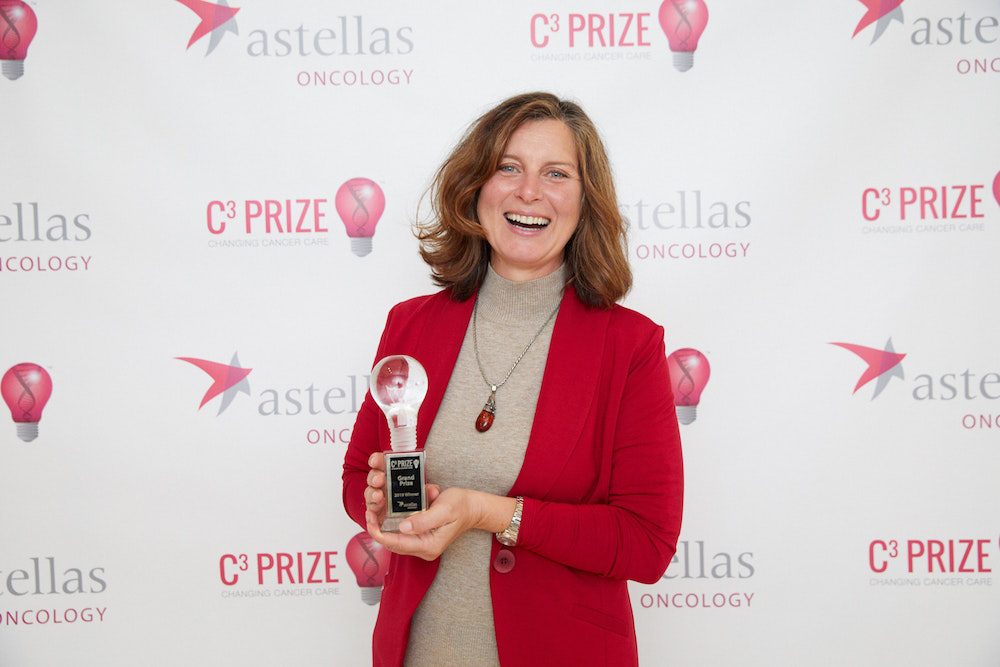
Among the most burdensome aspects of living with disease is the mental and social impact the illness exerts on patients and families. Beyond blindsiding the sufferer and their caregivers, these additional effects have, to a large extent, escaped the attention of pharma, which traditionally has concerned itself with developing and marketing medical treatments.
But a recent live pitch event shows one way industry is facilitating an advanced degree of non-medical support for patients undergoing treatment. Astellas Oncology’s C3 Prize, now in its fourth year, is a challenge that funds “the best ideas beyond medicine” to improve cancer care for all those involved.
“If a multinational corporation takes the time to say that non-medical solutions to care are important, it’s so motivating,” said Leah Werry, a volunteer for Toronto-based Nanny Angel Network, which was chosen by a five-person judging panel as the 2019 winner of the $100,000 grand prize.
The 10-year-old nonprofit organization provides specialized training for volunteers like Werry, who visit the homes of families to provide care for children whose mothers have cancer, in the form of fun, educational and therapeutic play activities. By maintaining routines and giving kids the space to ask difficult questions, the volunteers restore a measure of normalcy to the children’s lives, Werry explained during her pitch.
External prize competitions are one manifestation of the “open innovation” trend, which has firmly taken hold in healthcare over the last several years. More than three-quarters of healthcare industry organizations are developing an open innovation competency, compared to 59% of respondents from all industries, according to a 2018 Luminary Labs report.
Public-facing competitions like C3—shorthand for “changing cancer care”—are also a de-facto way of helping align patient services with the needs and wants of disease communities, albeit indirectly.
“Cancer treatment must be more than just medication delivered to the sick patient,” said Werry, who pitched on behalf of Nanny Angel Network founder Audrey Guth. The nonprofit’s free, in-home service “fills a big gap when it comes to cancer care for moms.”
Mark Reisenauer, SVP of the oncology business unit at Astellas, noted the overall lack of support available, something he realized when his own father was diagnosed in 2014 with head and neck cancer.
“It was amazingly difficult to help him just get through, day to day,” said Reisenauer. “It quickly became apparent to me there’s no roadmap, no direction and very few resources.”
This struck him as both interesting and challenging, he added. “I was in the cancer field. I was working in oncology for 25 years andI thought I knew how everything worked. I was sadly mistaken; there’s a lot of work to be done.”
Astellas’ C3 Prize judges, he said, look for solutions that line up with the challenges faced by those living with the disease and those who care for them: the patient journey (everyday decision-making), cancer health disparity (the burden of cancer support, along with tools and resources to help underserved areas) and survivorship (issues like returning to work and psychosocial issues patients encounter after a bout with the disease).
Guth said in a statement that she plans to use the prize money to expand her network’s reach, including its ability to recruit more volunteers. Werry said that building out the nonprofit’s IT systems can also help it expand to additional communities.
Two other finalists pitched their ideas to the judging panel and won $45,000 each: Daniella Koren, founder of Arches Technology, a digital patient education and engagement program (MyCareCompass) that’s getting traction from cancer centers to provide information and evidence-based education to people impacted by the illness; and Leslie Schover, founder of Will2Love, a provider of tailored, self-help education programs on the sexual health and fertility impacts of cancer.
A fourth innovator, Abby Westerman of b-present Foundation, won Astellas’ emerging ideas prize, which recognizes ideas that need additional cultivation. Westerman plans to use the $10,000 to extend the reach of b-there, a web-based patient tool that, among other things, allows young adults with cancer to communicate their mood via emojis and send updates to friends.
Over two months, Astellas received 240 applications from 15 countries—a record-breaking year in both respects. There’s no commercial contract or advance commitment between the startups and the corporate sponsor, an incentive which a lot of other external prize competitions offer participants. Nor are there any strings attached to the money.
The four C3 prize finalists received coaching from TEDMED before the event to prep them for their pitches. The four innovators will also have the option to attend TEDMED2020 and be enrolled in Matter, a Chicago-based incubator and innovation accelerator, for one year.
As Werry noted, such perks demonstrate a level of “professional respect” on Astellas’ behalf toward these innovators. And that’s essential when a company is basically appealing to the world for good ideas that can help improve cancer care.






